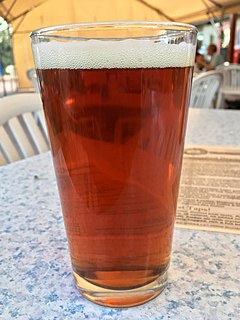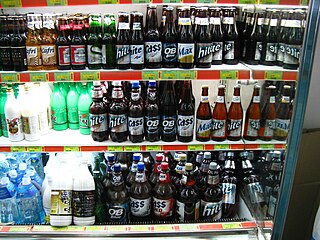Related Research Articles

Beer is one of the oldest and most widely consumed alcoholic drinks in the world, and the third most popular drink overall after water and tea. It is produced by the brewing and fermentation of starches, mainly derived from cereal grains—most commonly from malted barley, though wheat, maize (corn), rice, and oats are also used. During the brewing process, fermentation of the starch sugars in the wort produces ethanol and carbonation in the resulting beer. Most modern beer is brewed with hops, which add bitterness and other flavours and act as a natural preservative and stabilizing agent. Other flavouring agents such as gruit, herbs, or fruits may be included or used instead of hops. In commercial brewing, the natural carbonation effect is often removed during processing and replaced with forced carbonation.

Brewing is the production of beer by steeping a starch source in water and fermenting the resulting sweet liquid with yeast. It may be done in a brewery by a commercial brewer, at home by a homebrewer, or communally. Brewing has taken place since around the 6th millennium BC, and archaeological evidence suggests that emerging civilizations, including ancient Egypt and Mesopotamia, brewed beer. Since the nineteenth century the brewing industry has been part of most western economies.

Pale ale is a typically golden to amber coloured style of ale which is brewed using an ale yeast and predominantly pale malt. The term first appeared around 1703 for beers made from malts dried with high-carbon coke, which resulted in a lighter colour than other beers popular at that time. Different brewing practices and hop quantities have resulted in a range of tastes and strengths within the pale ale family.

Wheat beer is a top-fermented beer which is brewed with a large proportion of wheat relative to the amount of malted barley. The two main varieties are German Weizenbier and Belgian witbier; other types include Lambic, Berliner Weisse, and Gose.

The Reinheitsgebot is a series of regulations limiting the ingredients in beer in Germany and the states of the former Holy Roman Empire. The best known version of the law was adopted in Bavaria in 1516, but similar regulations predate the Bavarian order, and modern regulations also significantly differ from the 1516 Bavarian version. Although today, the Reinheitsgebot is mentioned in various texts about the history of beer, historically it was only applied in the duchy of Bavaria and from 1906 in Germany as a whole, and it had little or no effect in other countries or regions.
Big Rock Brewery is a Canadian public company and the largest brewery that is based in Calgary, Alberta, Canada. Additional brewing operations are located in Vancouver, British Columbia; Etobicoke, Ontario; and Liberty Village in Toronto, Ontario. Big Rock distributes a variety of beers and ciders throughout Canada.

Smoked beer is a type of beer with a distinctive smoke flavour imparted by using malted barley dried over an open flame.

India pale ale (IPA) is a hoppy beer style within the broader category of pale ale.
Berliner Weisse is a cloudy, sour beer of around 5% alcohol by volume. It is a regional variation of the wheat beer style from Northern Germany, dating back to at least the 16th century. It can be made from combinations of malted barley and wheat, with the stipulation that the malts are kilned at very low temperatures or even air-dried to minimise colour formation. The fermentation takes place with a mixture of yeast and lactic acid bacteria, a prerequisite that creates the lactic acid taste, a distinguishing feature of Berliner Weisse.

Fuller's Brewery in Chiswick in the west of London was a family-run business from its foundation in 1845 until 2019. In that year, the brewing division of Fuller, Smith & Turner PLC was sold to the Japanese international beverage giant Asahi.

Beer has been brewed in England for hundreds of years. As a beer brewing country, it is known for top fermented cask beer which finishes maturing in the cellar of the pub rather than at the brewery and is served with only natural carbonation.

Beer, called maekju in Korean, was first introduced to Korea in the early 20th century. Seoul's first beer brewery opened in 1908. Two current major breweries date back to the 1930s. The third brewery established in Korea, Jinro Coors Brewery, was founded in the 1990s. It was later acquired by Oriental Breweries (OB). Hite Breweries's former name was Chosun Breweries, which was established in 1933. The company changed its name to Hite Breweries in 1998. OB Breweries established as Showa Kirin Breweries in 1933. The company changed its name to OB Breweries in 1995.

Beer is one of the oldest drinks humans have produced. The first chemically confirmed barley beer dates back to the 5th millennium BC in modern-day Iran, and was recorded in the written history of ancient Egypt and Mesopotamia and spread throughout the world.
Gluten-free beer is beer made from ingredients that do not contain gluten such as millet, rice, sorghum, buckwheat or corn (maize). People who have gluten intolerance have a reaction to certain proteins in the grains commonly used to make beer, barley and wheat. The hordein found in barley and the gliadin found in wheat are types of gluten that can trigger symptoms in sufferers of these diseases. Gluten-free beer is part of a gluten-free diet.

The Malt Shovel Brewery is an Australian brewery owned by Lion, which in turn is a subsidiary of the Japanese conglomerate Kirin. It is located in Camperdown, New South Wales. Malt Shovel is best known for its James Squire range of beers. The beer is named after the convict turned Australia's first brewer James Squire, who also went on to grow Australia's first hops and is said to have created Australia's first commercial brewery.

Lager is beer which has been brewed and conditioned at low temperature. Lagers can be pale, amber, or dark. Pale lager is the most widely consumed and commercially available style of beer. The term "lager" comes from the German for "storage", as the beer was stored before drinking – traditionally in the same cool caves it was fermented in.

Porter is a style of beer that was developed in London, England, in the early 18th century. It was well-hopped and dark in appearance owing to the use of brown malt. The name originated from its popularity with street and river porters.
International Women's Collaboration Brew Day is an annual event that takes place each year on International Women's Day. The event gathers women brewers around the world who brew the same beer. All proceeds are donated to charity. It was established to raise awareness of women in the brewing industry, especially as beer brewmasters. It also networks women interested in brewing.
Jaega Wise is an English beer brewer, campaigner, broadcaster and author. Born in London and raised in Nottingham, she is the head brewer and co-founder of London-based Wild Card Brewery and in 2018 was named "Brewer of the Year" by the British Guild of Beer Writers. Before becoming a brewer, she studied chemical engineering and worked as a chemicals trader. Alongside brewing, Wise campaigns on various issues within the beer and wider drinks industries, including sexism, race and disability. She has also presented several radio and television shows, including BBC Radio 4's The Food Programme and Amazon Prime's Beer Masters.
The city of Rochester, New York—before being known as the birthplace of Kodak, Xerox, and Bausch & Lomb—was internationally known for its robust brewing industry. Indeed, the city was uniquely positioned for such an industry in the early 19th century. The corn, rye, barley, wheat, and other grains grown in the Genesee River Valley were shipped down river to be milled in such quantity that by 1838 Rochester was world's largest flour producer, earning it the nickname the Flour City.
References
- ↑ Steele, Beth (28 June 2019). "#SummerOfPub series – meet Burnt Mill Brewery's Head Brewer Sophie de Ronde". wb.camra.org.uk. Campaign for Real Ale . Retrieved 11 April 2022.
- 1 2 3 French, Phoebe (8 March 2019). "Top female brewers in the UK". thedrinksbusiness.com. The Drinks Business . Retrieved 11 April 2022.
- 1 2 "A Beer With… Sophie de Ronde, Burnt Mill Brewery". simpsonsmalt.co.uk. Simpson's Malt. 4 March 2020. Retrieved 11 April 2022.
- 1 2 "Special worldwide brew day set up for female beer makers". chelmsfordweeklynews.co.uk. Chelmsford and Mid Essex Times. 11 February 2014. Retrieved 11 April 2022.
- 1 2 "Sheffield Beer Week: Women in Beer". exposedmagazine.co.uk. 4 March 2019. Retrieved 11 April 2022.
- ↑ Brodie, Duncan (6 April 2015). "Sisters are brewin' it for themselves". eadt.co.uk. East Anglian Daily Times . Retrieved 11 April 2022.
- ↑ McCoy, Frankie (7 March 2018). "The female brewers you need to know about on International Women's Day". standard.co.uk. Evening Standard . Retrieved 11 April 2022.
- ↑ Eads, Lauren (30 July 2014). "Annual "Beer Day Britain" launched". thedrinksbusiness.com. The Drinks Business . Retrieved 11 April 2022.
- ↑ "Sophie to brew up ideas for Muntons". suffolknews.co.uk. Suffolk News. 1 January 2015. Retrieved 11 April 2022.
- 1 2 3 Pomranz, Mike (22 April 2019). "This 'Beethoven of Brewing' Makes Some of England's Best Beers — and She Can't Even Taste Them". foodandwine.com. Food & Wine . Retrieved 11 April 2022.
- ↑ "Brewers Congress". The Brewers Journal. No. September 2018. Hemel Hempstead: Reby Media. p. 31. Retrieved 11 April 2022.
- ↑ "SIBA Award for Brewer of the Year". beerguild.co.uk. The British Guild of Beer Writers. Retrieved 11 April 2022.
- ↑ "Sophie de Ronde". linkedin.com. LinkedIn . Retrieved 12 April 2022.